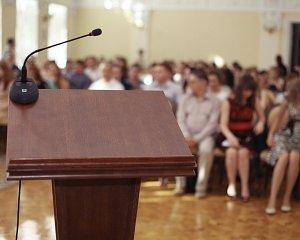Preparing to Present at an Academic Conference
Academic conferences are an essential part of developing an academic profile and maturing as a researcher. It is exciting to engage with other academics in person; you suddenly have the opportunity to listen to all those authors whose works you have been reading, to meet them at lunches, or to talk to them in the coffee queue.
 © kichigin19 / Adobe Stock
© kichigin19 / Adobe Stock
Academic conferences offer unique opportunities for networking, learning, and developing. However, they can also be a terrifying experience, especially at the beginning of one´s academic career.
It is important to develop one´s own way of dealing with academic conferences, but you can try following the 3 rules that helped me to get started successfully – my ‘3 Be's for academic conferencing’:
1. Be Prepared
Hardly anyone can afford to send their paper the evening before the conference, without getting a bad reputation. As soon as your paper gets accepted for a conference, make a plan: consider that you will be asked to upload or circulate your paper one or two weeks before the conference starts. Ensure you reserve time to finalise your paper before this deadline. Make sure you also schedule some time at least a few days before the conference begins to read the other papers on your panel, and to inform yourself about your chair and discussant.
Prepare your presentation as well as you can. It is unrealistic that you can fit all your PhD research in your time slot of 10 minutes or so. Thus, be realistic about how much (and how many slides) you can present in the allocated time. Align your message with what you want to get out of your presentation: do you want others to get interested in your research? Do you want to get feedback on some methodological or empirical choices?
Rehearse and practice your presentation, and time it. Being well prepared will make you more confident, will signal to your audience that you take them seriously and behave professionally, and allow you to focus on the reaction of your audience.
Also, think about what you want to achieve with your conference attendance, aside from presenting your research: check the conference programme for academics working on your research interests. Attend their presentations to get acquainted with the wider debate. You might even want to get in touch with someone in advance to arrange a coffee or short chat during the conference.
2. Be Yourself
While it is very useful to learn from the tips and tricks of seasoned conference-goers, the best way to make use of them is by adapting them to your own style. Know what you are comfortable with and find your own way of interacting in a genuine manner.
Be professional but also do not be scared to show why you are excited about your research. And most importantly, do not pretend or show off. You do not want to be remembered for being the arrogant and pretentious scholar, who is incapable of listening or taking suggestions on board.
3. Be Human
Conferences are social interactions: socialize, listen, learn. Watch others and learn from their way of presenting, communicating, and asking questions. Also, if you have time, do not only visit panels in line with your own narrow research topic but visit other panels too. This is a great way to catch up with research trends in the wider field, particularly at interdisciplinary conferences such as UACES. This is particularly important for teaching and supervising, where one often has to go beyond one’s own narrow research interests.
Do not make the mistake of thinking you are only there to present your research. You are there to become part of an academic community, which means that you need to invest time and engage beyond your own panel appearance. When you are part of the audience, show interest and ask questions. We all like engaging audiences, so be one. Also, do not only network with the “big names” in your field (i.e. professors), but also engage with your peers. These are the people with whom you will share the largest part of your career, and it is indispensable to learn, exchange and create supportive networks with one´s peers.
All of that being said, the most important tip I can give you is simple: enjoy it. Try to enjoy these moments of exchange, engagement and stimulation. Travelling to interesting places for a conference, and meeting so many interesting and smart people is certainly one of the highlights of the academic year.
About the author

The European Commission’s support for the production of this publication does not constitute an endorsement of the contents, which reflect the views only of the authors, and the Commission cannot be held responsible for any use which may be made of the information contained therein.

